

Kanada. Kanada (Sanskrit: कणाद) was a Hindu sage and philosopher who founded the philosophical school of Vaisheshika and authored the text Vaisheshika Sutra.[1][2] He probably lived around the 2nd century BCE,[3] while other sources claim he lived in the 6th Century BCE.[4][5] It is believed that he was born in Prabhas Kshetra (near Dwaraka) in Gujarat, India.
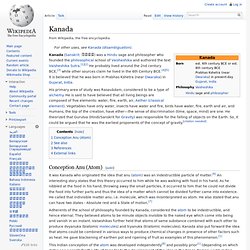
Conception Anu (Atom)[edit] It was Kanada who originated the idea that anu (atom) was an indestructible particle of matter.[6] An interesting story states that this theory occurred to him while he was walking with food in his hand. As he nibbled at the food in his hand, throwing away the small particles, it occurred to him that he could not divide the food into further parts and thus the idea of a matter which cannot be divided further came into existence. He called that indivisible matter anu, i.e. molecule, which was misinterpreted as atom.
Theophrastus. Life[edit] Most of the biographical information we have of Theophrastus was provided by Diogenes Laërtius' Lives and Opinions of Eminent Philosophers, written more than four hundred years after Theophrastus' time.[2] He was a native of Eresos in Lesbos.[3] His given name was Tyrtamus (Τύρταμος), but he later became known by the nickname "Theophrastus," given to him, it is said, by Aristotle to indicate the grace of his conversation (from Ancient Greek Θεός "god" and φράζειν "to phrase", i.e. divine expression).[4] Theophrastus presided over the Peripatetic school for thirty-five years,[12] and died at the age of eighty-five according to Diogenes.[13] He is said to have remarked "we die just when we are beginning to live".[14]
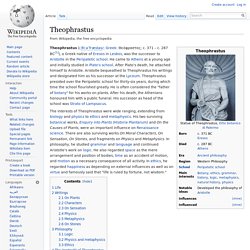
Stilpo. Aristotle. Aristotle's views on physical science profoundly shaped medieval scholarship.
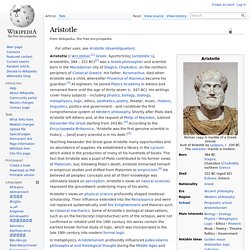
Their influence extended into the Renaissance and were not replaced systematically until the Enlightenment and theories such as classical mechanics. Some of Aristotle's zoological observations, such as on the hectocotyl (reproductive) arm of the octopus, were not confirmed or refuted until the 19th century. His works contain the earliest known formal study of logic, which was incorporated in the late 19th century into modern formal logic. His ethics, though always influential, gained renewed interest with the modern advent of virtue ethics. All aspects of Aristotle's philosophy continue to be the object of active academic study today. Xenocrates. Life[edit] Xenocrates was a native of Chalcedon.[2] By the most probable calculation[3] he was born 396/5 BC, and died 314/3 BC at the age of 82.
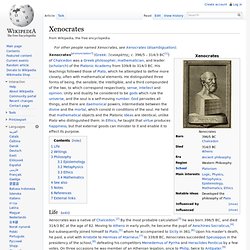
Moving to Athens in early youth, he became the pupil of Aeschines Socraticus,[4] but subsequently joined himself to Plato,[5] whom he accompanied to Sicily in 361.[6] Upon his master's death, he paid, a visit with Aristotle to Hermias of Atarneus.[7] In 339/8 BC, Xenocrates succeeded Speusippus in the presidency of the school,[8] defeating his competitors Menedemus of Pyrrha and Heraclides Ponticus by a few votes. On three occasions he was member of an Athenian legation, once to Philip, twice to Antipater.[9] Xenocrates resented the Macedonian influence then dominant at Athens. Soon after the death of Demosthenes (c. 322 BC), he declined the citizenship offered to him at the instance of Phocion as a reward for his services in negotiating peace with Antipater after Athens' unsuccessful rebellion.
Diogenes of Sinope. Diogenes of Sinope was a controversial figure. His father minted coins for a living, and when Diogenes took to debasement of currency, he was banished from Sinope.[1] After being exiled, he moved to Athens to debunk cultural conventions. Diogenes modelled himself on the example of Hercules. He believed that virtue was better revealed in action than in theory. He used his simple lifestyle and behaviour to criticise the social values and institutions of what he saw as a corrupt society. He declared himself a cosmopolitan. Speusippus. Speusippus[pronunciation?]
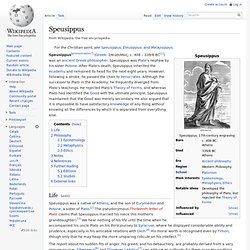
(Greek: Σπεύσιππος; c. 408 – 339/8 BC[1]) was an ancient Greek philosopher. Speusippus was Plato's nephew by his sister Potone. After Plato's death, Speusippus inherited the Academy and remained its head for the next eight years. However, following a stroke, he passed the chair to Xenocrates. Although the successor to Plato in the Academy, he frequently diverged from Plato's teachings. Plato. Plato (/ˈpleɪtoʊ/; Greek: Πλάτων Plátōn "broad"pronounced [plá.tɔːn] in Classical Attic; 428/427 or 424/423 – 348/347 BCE) was a philosopher, as well as mathematician, in Classical Greece.
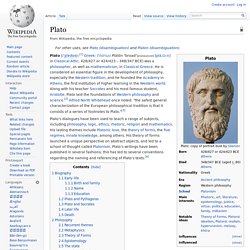
Aristippus. Aristippus (Greek: Ἀρίστιππος) of Cyrene (c. 435 – c. 356 BCE) was the founder of the Cyrenaic school of Philosophy.[1] He was a pupil of Socrates, but adopted a very different philosophical outlook, teaching that the goal of life was to seek pleasure by adapting circumstances to oneself and by maintaining proper control over both adversity and prosperity.
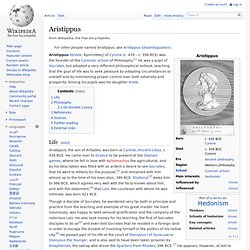
Among his pupils was his daughter Arete. Life[edit] Aristippus, the son of Aritades, was born at Cyrene, Ancient Libya, c. 435 BCE. He came over to Greece to be present at the Olympic games, where he fell in love with Ischomachus the agriculturist, and by his description was filled with so ardent a desire to see Socrates, that he went to Athens for the purpose,[2] and remained with him almost up to the time of his execution, 399 BCE. Diodorus[3] dates him to 366 BCE, which agrees very well with the facts known about him, and with the statement,[4] that Lais, the courtesan with whom he was intimate, was born 421 BCE.
Antisthenes. Euclid of Megara. Euclid of Megara (/ˈjuːklɪd/; also Euclides, Eucleides; Greek: Εὐκλείδης; c. 435 – c. 365 BCE[1]) was a Greek Socratic philosopher who founded the Megarian school of philosophy.
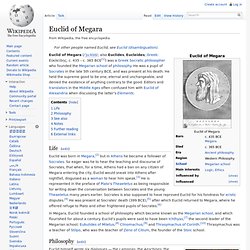
He was a pupil of Socrates in the late 5th century BCE, and was present at his death. He held the supreme good to be one, eternal and unchangeable, and denied the existence of anything contrary to the good. Editors and translators in the Middle Ages often confused him with Euclid of Alexandria when discussing the latter's Elements. Socrates. Socrates (/ˈsɒkrətiːz/;[2] Greek: Σωκράτης [sɔːkrátɛːs], Sōkrátēs; 470/469 – 399 BC)[1] was a classical Greek (Athenian) philosopher credited as one of the founders of Western philosophy.
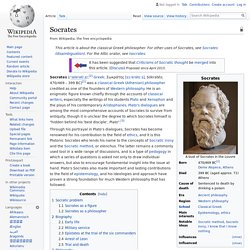
He is an enigmatic figure known chiefly through the accounts of classical writers, especially the writings of his students Plato and Xenophon and the plays of his contemporary Aristophanes. Plato's dialogues are among the most comprehensive accounts of Socrates to survive from antiquity, though it is unclear the degree to which Socrates himself is "hidden behind his 'best disciple', Plato".[3] Through his portrayal in Plato's dialogues, Socrates has become renowned for his contribution to the field of ethics, and it is this Platonic Socrates who lends his name to the concepts of Socratic irony and the Socratic method, or elenchus. Socratic problem Nothing written by Socrates remains extant. René Descartes.
Descartes laid the foundation for 17th-century continental rationalism, later advocated by Baruch Spinoza and Gottfried Leibniz, and opposed by the empiricist school of thought consisting of Hobbes, Locke, Berkeley, and Hume.
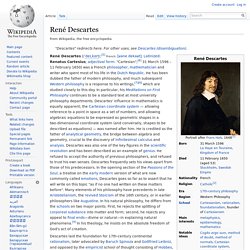
Leibniz, Spinoza and Descartes were all well versed in mathematics as well as philosophy, and Descartes and Leibniz contributed greatly to science as well. His best known philosophical statement is "Cogito ergo sum" (French: Je pense, donc je suis; I think, therefore I am), found in part IV of Discourse on the Method (1637 – written in French but with inclusion of "Cogito ergo sum") and §7 of part I of Principles of Philosophy (1644 – written in Latin). Early life[edit] Descartes was born in La Haye en Touraine (now Descartes), Indre-et-Loire, France. When he was one year old, his mother Jeanne Brochard died. In his book, Discourse On The Method, he says "I entirely abandoned the study of letters.